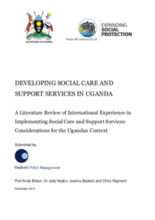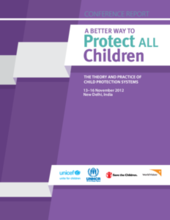Displaying 241 - 250 of 454
This report summarises the presentations and conclusions from the 2nd Pan-African annual conference on parenting held on the 16-17th October 2013 in Malawi on the theme of "Understanding realities of teenage parenting: a special focus on adolescents (boys and girls) with parenting responsibilities."
The United Nations General Assembly adopted on the 18th December 2013 a resolution on Preparations for and observance of the twentieth anniversary of the International Year of the Family.
This book by Dr. Xiaoyuan Shang and Karen Fisher provides a comprehensive and clear picture of the situation of children who are orphaned or abandoned in China. It introduces the context and framework for the alternative care system and China’s welfare system as it applies to children, and provides a profile of orphans and of care arrangements, describing both the formal child welfare system and the informal care system, particularly kinship care.
This presentation to the 2012 Sofia Conference by Paul Martin introduces family support mechanisms and services to better equip parents to care for their children.
This paper provides a review of international and Ugandan literature on social care and support services particularly focussing on identifying key lessons that are relevant to the Ugandan context.
The second of two important presentations by Dr. Stela Grigorash, the Director of Partnerships for EveryChild Moldova, on the important work and lessons learnt in reforming the care system in that country.
This report of a major conference held in New Delhi in November 2012 entitled “A Better Way to Protect ALL Children: The Theory and Practice of Child Protection Systems”, encapsulates the substantive content of the presentations and related discussion; provides an analysis and documents the journey; and suggest an agenda, or at least direction, for future work on Child Protection systems.
This study funded by Big Lottery and undertaken in partnership between the University of Bristol and Buttle UK, a grant-giving charity for vulnerable children, aims to fill gaps in understanding about the experiences of children living with kins, and in particular how children in informal kinship care view their situation.
A coalition of over 40 international, regional and national NGOs and networks have issued a joint call to member States of the United Nations General Assembly (UN GA) to focus the 2014 Resolution on the Rights of the Child on strengthening family care and providing appropriate alternative care for children.
Oxford Policy Management has conducted two rounds of qualitative evaluations of three poverty-reduction and human development programmes run by the BOTA Foundation in Kazakhstan: the Conditional Cash Transfer (CCT) Programme, the Social Services Programme and the Tuition Assistance Programme. Each report produced by Oxford Policy Management includes a description of the methodology and results of the fieldwork as well as conclusions and recommendations.








